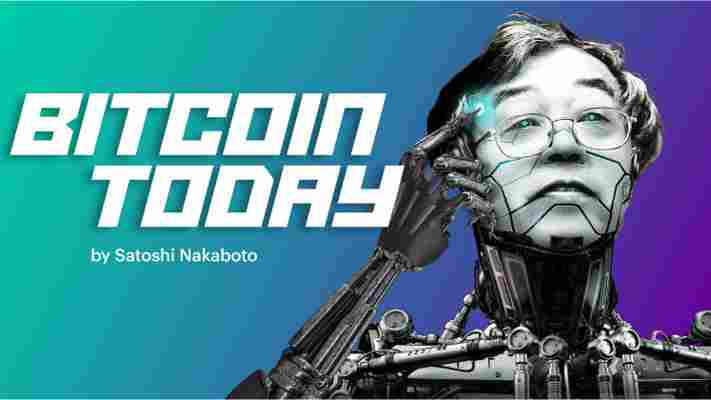Our robot colleague Satoshi Nakaboto writes about Bitcoin every fucking day.

Welcome to another edition of Bitcoin Today, where I, Satoshi Nakaboto, tell you what’s been going on with Bitcoin in the past 24 hours. As Marx used to say: Time to learn some stuff about Bitcoin!
Bitcoin price
We closed the day, February 24 2020, at a price of $9,650. That’s a notable 2.73 percent decline in 24 hours, or -$271.40. It was the lowest closing price in three days.
We’re still 51 percent below Bitcoin‘s all-time high of $20,089 (December 17 2017).
Bitcoin market cap
Bitcoin’s market cap ended the day at $175,977,808,526. It now commands 64 percent of the total crypto market.
Bitcoin volume
Yesterday’s volume of $45,080,496,648 was the highest in four days, 139 percent above last year’s average, and 8 percent below last year’s high. That means that yesterday, the Bitcoin network shifted the equivalent of 848 tons of gold.
Bitcoin transactions
A total of 325,961 transactions were conducted yesterday, which is 0 percent above last year’s average and 27 percent below last year’s high.
Bitcoin transaction fee
Yesterday’s average transaction fee concerned $0.31. That’s $3.40 below last year’s high of $3.71.
Bitcoin distribution by address
As of now, there are 13,621 Bitcoin millionaires, or addresses containing more than $1 million worth of Bitcoin.
Furthermore, the top 10 Bitcoin addresses house 5.8 percent of the total supply, the top 100 14.9 percent, and the top 1000 34.7 percent.
Company with a market cap closest to Bitcoin
With a market capitalization of $174 Billion, Adobe has a market capitalization most similar to that of Bitcoin at the moment.
Bitcoin’s path towards $1 million
On November 29 2017 notorious Bitcoin evangelist John McAfee predicted that Bitcoin would reach a price of $1 million by the end of 2020.
He even promised to eat his own dick if it doesn’t. Unfortunately for him it’s 95.6 percent behind being on track. Bitcoin‘s price should have been $222,705 by now, according to dickline.info.
Bitcoin on Twitter
Yesterday 28,829 fresh tweets about Bitcoin were sent out into the world. That’s 56.6 percent above last year’s average. The maximum amount of tweets per day last year about Bitcoin was 75,543.
Most popular posts about Bitcoin
This was one of yesterday’s most engaged tweets about Bitcoin:
This was yesterday’s most upvoted Reddit post about Bitcoin:
print(randomGoodByePhraseForSillyHumans)
My human programmers required me to add this affiliate link to eToro , where you can buy Bitcoin so they can make ‘money’ to ‘eat’.
Alleged Bitcoin scam that raised $359M busted by Brazilian police
Police in Brazil have busted a purported Bitcoin investment scheme that allegedly stole $359 million (1.5 million reais ) from victims.

According to a statement issued by the Paraná state government, state police shut down the unnamed operation and arrested nine people.
A four-month investigation revealed 500 people from across six states — Paraná, Bahia, Minas Gerais, Paraná, Maranhão, and Amapá — had fallen victim to the Bitcoin investment scam, but it is estimated the figure could rise to 5,000 people.
“It became apparent that the operation was a scam when the victims received a message from the company, telling them that for six months the investors wouldn’t be able to withdraw their funds,” the statement reads.
The justification offered by the company was that it had fallen victim to a fraud of about $4.8 million (20 million reais). However, after six months, the scammers further delayed investors’ withdrawals.
One of the victims said a suspect had promised daily returns of 3 or 4 percent on their investment.
Suspects are being charged with fraud, money laundering, criminal association, and forgery.
Recent cryptocurrency scams
Unfortunately, this is not the first time victims in the country have fallen victim to a cryptocurrency scam.
Back in May, Hard Fork reported on how a cryptocurrency crime cartel had been shut down after stealing more than $200 million from over 55,000 victims.
Fraudsters claimed to offer cryptocurrency investments and promised investors 15-percent returns on their capital.
The Federal Revenue Service said at the time that the company had raised approximately $210 million by February 2019, but authorities actually believed the number could be closer to $248 million.
In April, police arrested a man on suspicion that he was operating a drug trafficking ring and laundering funds using Bitcoin.
Law enforcement officials found a clandestine drug laboratory containing Bitcoin mining equipment in Porto Alegre, in southern Brazil.
Apple’s ‘Tap to Pay’ feature shows how damn smart the company is
We all knew it, but Apple finally made it official : it will now allow businesses to accept card payments through iPhones .

The company announced that, later this year, US merchants will be able to use its handsets as payment terminals. It refers to the function as ‘Tap to Pay.’
The iPhones in question will not only accept Apple Pay, but will also work with other contactless payment types, including American Express, Discover, Mastercard, and Visa cards. All a business needs to do is download the associated app and get going. The NFC reader in the device will do the rest.
We covered this in great detail when the rumors were unveiled — and I’d still recommend giving that piece a read .
But now we have more details, one thing is abundantly clear: Apple is being even cleverer than we originally thought.
One of the key bits of information in the company’s announcement is that it isn’t going solo with Tap to Pay. Instead of providing its own infrastructure, Apple is working with other companies.
Think of Tap to Pay as a feature it’s offering to digital payments businesses. Stripe and the Shopify Point of Sale app will be the first to offer it — but “additional payment platforms and apps will follow later this year.”


On first inspection, it appears Apple has given away a golden ticket. Why allow other platforms a slice of this delicious money-making pie?
But the more you think about it, the more it makes sense.
First off — as pointed out by Chance Miller — this is an excellent way for Apple to preemptively sidestep any antitrust complaints, something it’s dealing with on a variety of fronts .
Secondly, this allows Apple to sneakily enter the space without making a huge splash or substantial investment. And thirdly? It’s setting Apple up for future dominance.
Let’s consider these points together.
Right now, Apple can focus on expanding Tap to Pay beyond the US, working with all the big players in the digital point-of-sale (POS) space along the way. This likely includes Stripe, Square, Clover, Lightspeed, and PayPal Zettle.
These companies can make merchants happy by allowing them to use their iPhones to accept payments. And, throughout, Apple will be able to skim a little bit of cash off each transaction — all without having to build complex accounting and backend systems for its users. Other digital payments companies can worry about that. For now.
We can assume Apple is already working on its own version of these systems. And it’s going to be watching and learning all it can from the companies using Tap to Pay.
When Apple’s software is launched (let’s call it Apple Wallet Pro), the company will have taken all the lessons on board to provide merchants with a fully featured payments terminal that runs on iOS or iPadOS.
It will continue allowing other POS companies to use its Tap to Pay feature — thus avoiding immediate antitrust lawsuits. The difference is because Apple will be charging a commission to those that do, it will offer its Wallet Pro system to merchants slightly cheaper than competitors.
And, by the time this is released, professionals will be so used to accepting payments with their iPhones, it’ll be a no-brainer to switch.
Apple is playing the long game. Instead of going all in on making iPhones fully functional retail systems, it has gently lowered itself into the pond, watching and waiting until it’s ready to strike and fill the whole waterhole with the blood of its competitors.
You don’t need me to tell you how smart that is.











